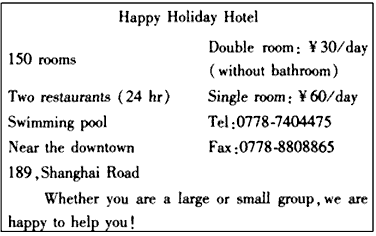题目内容
Most couples could have only one child except some special families and those in some special areas.
2 Usually, all around good student, which was called "thrice good", was given to the students who
were virtuous (品德高尚的), talented and good at PE. It was firstly used in to 1950s by Mao to encourage
young people to keep fit, study well and work hard.
3 During the early 1990s, state owned company reforms (国有企业改革) were getting tough. The
workers were more than the jobs in most of the cities. Many workers were losing their jobs. "Jobless" was
a hot topic at that time, so the leaders hoped the laid off workers could find new jobs or start up their own
business.
4 One of Deng’s clever ideas, "one country, two systems", was first performed in 1997. It described
Hong Kong and Macao's situation after they returned to China. This policy would also be suitable for
Taiwan. There would be one China, but Hong Kong, Macao and Taiwan could have their own economies
and political systems.
5 Lei Feng was a soldier who was happy to help others. He died in an accident in 1962. On March 5th,
1963, Mao wrote a piece, "Learn from comrade Lei Feng", to say the Chinese should help others when
necessary. After that, March 5th became a Volunteer Day.
6 The phrase "harmonious society" appeared in 2004, referring to a peaceful society where all people
would work together to make the life better. This idea has become the main goal of the Chinese Communist
Party now.
B. the only child in China
C. the one child family
D. the family planning policy
B. 到处的
C. 向各个方向的
D. 有多方面才能的
B. Hu Jintao.
C. Mao Zedong.
D. Jiang Zemin.
B. 2→5→4→3→1→6
C. 2→5→1→3→4→6
D. 2→1→5→3→6→4

阅读理解
| Channel 1(一频道) | Channel 2 |
| 18:00 Around China | 15:45 Computers today |
| 18:30 Children’s program | 18:10 Foreign arts |
| 19:00 News | 18:30 Modern English |
| 19:30 Weather report | 19:00 Animal world |
| 19:40 Around the world | 19:25 In Asia |
| 20:10 TV play: Sister | 20:20 Sports |
| 21:00 English for today | 21:00 Sports player—Yao Ming |
| 21:15 Pop music | 21:45 English news |
| 21:55 Talk show | 22:05 On TV next week |
| A.TalkShow | B.Sports | C.Sportsplayer | D.TVplay |
| A.animals | B.news | C.foreignarts | D.Asia |
| A.Sports | B.Aroundtheworld | C.Foreignarts | D.Englishnews |
| A.at21:45onChannel2 | B.at21:55onChannel1 |
| C.at21:00onChannel2 | D.at21:15onChannel1 |
| A.teachesyouEnglish |
| B.tellsyousomethingaboutEnglishclassroom |
| C.letyouknowEnglishnews |
| D.helpsyoumakeforeignfriends |
阅读理解
|
Channel 1(一频道) |
Channel 2 |
|
18:00 Around China |
15:45 Computers today |
|
18:30 Children’s program |
18:10 Foreign arts |
|
19:00 News |
18:30 Modern English |
|
19:30 Weather report |
19:00 Animal world |
|
19:40 Around the world |
19:25 In Asia |
|
20:10 TV play: Sister |
20:20 Sports |
|
21:00 English for today |
21:00 Sports player—Yao Ming |
|
21:15 Pop music |
21:45 English news |
|
21:55 Talk show |
22:05 On TV next week |
1.If you want to know something about Yao Ming, the best program for you is ______.
|
A.TalkShow |
B.Sports |
C.Sportsplayer |
D.TVplay |
2. You’ll know something about ________ at 19:00 on Channel 2.
|
A.animals |
B.news |
C.foreignarts |
D.Asia |
3. If you want to watch NBA, the best program for you would be_______.
|
A.Sports |
B.Aroundtheworld |
C.Foreignarts |
D.Englishnews |
4. If you like music very much, the best program is______.
|
A.at21:45onChannel2 |
B.at21:55onChannel1 |
|
C.at21:00onChannel2 |
D.at21:15onChannel1 |
5. “Modern English” is a program that ______.
|
A.teachesyouEnglish |
|
B.tellsyousomethingaboutEnglishclassroom |
|
C.letyouknowEnglishnews |
|
D.helpsyoumakeforeignfriends |

